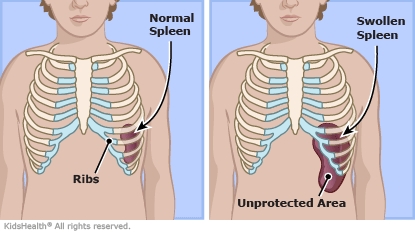Mononucleosis (Mono): How to Care for Your Child
Mononucleosis — commonly called mono — is a viral infection that causes symptoms like tiredness, fever, sore throat, and swollen lymph nodes in the neck. It also can cause a swollen spleen. When it does, it's important to protect the spleen from injury. It can take several weeks for someone with mono to feel better, but plenty of fluids and rest will help.


-
Let your child rest as much as needed.
-
Make sure your child drinks lots of liquids.
-
Gargling with warm saltwater may help relieve a sore throat.
-
If your child has a fever and is uncomfortable, a medicine may help your child feel better:
-
acetaminophen (such as Tylenol® or a store brand)
-
OR
-
ibuprofen (such as Advil®, Motrin®, or a store brand). Don't give to babies under 6 months old.
-
Do not give aspirin to your child or teen, as it has been linked to a rare but serious illness called Reye syndrome.
-
Help protect the spleen from injury. Your child should avoid rough play, contact sports, heavy lifting, and strenuous activity until cleared by the health care provider.

-
symptoms do not get better after a few weeks or begin to get worse
-
your child gets new symptoms
-
your child has a lasting fever or a fever that goes away and then returns
-
your child's eyes or skin look yellowish

Your child:
-
has belly pain, especially if it's sharp and comes on suddenly
-
is pale, faint, or dizzy
-
has trouble swallowing or breathing
-
develops weakness of the arms or legs
-
has a stiff neck or severe headache

How do kids get mono? Mono is caused by a virus called Epstein–Barr virus (EBV). It spreads through contact with saliva (spit), often through kissing, coughing, sneezing, or sharing eating utensils, straws, or drinking glasses. It also can spread through sexual contact and blood transfusions, but this is much less common.
Most people become infected with EBV at some point in their lives. Then, the virus stays in their body for life in an inactive form. It might find its way into the person's spit from time to time, even without causing symptoms. This means they can pass on the virus even when they aren't sick. This is why it is so important to wash hands well and often and not share drinks or eating utensils with other people, even when they seem healthy.
How is mono treated? There is no specific medicine for mono. It has to run its course with treatment to relieve symptoms. Many symptoms improve within a few weeks, but sometimes it takes a couple of months to feel completely better.